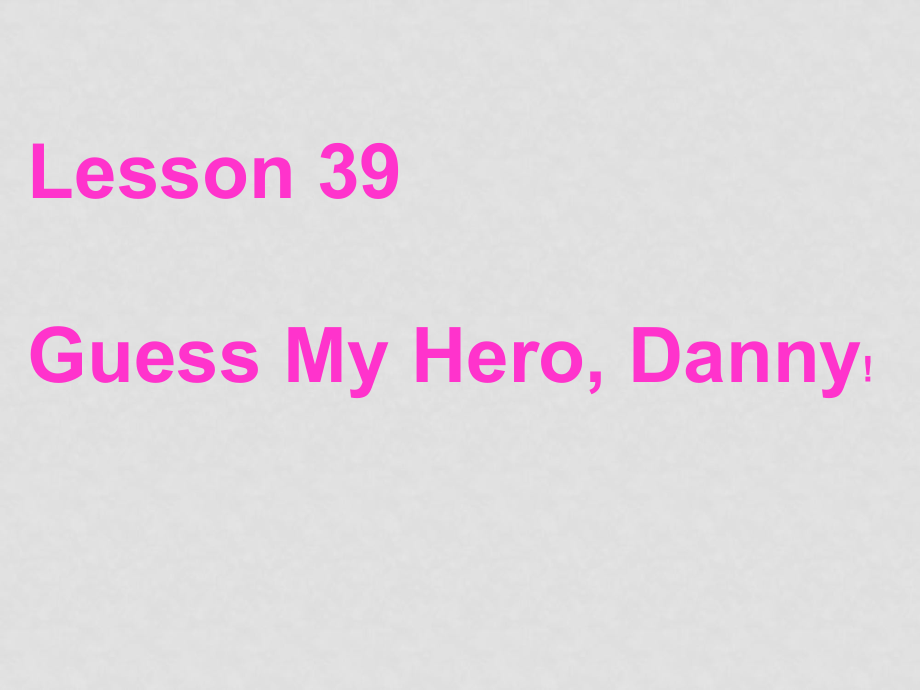《九年級(jí)英語(yǔ)上:Unit 5 Great Peoplelesson 39 Guess My Hero,Danny!課件冀教版》由會(huì)員分享���,可在線閱讀�����,更多相關(guān)《九年級(jí)英語(yǔ)上:Unit 5 Great Peoplelesson 39 Guess My Hero,Danny!課件冀教版(17頁(yè)珍藏版)》請(qǐng)?jiān)谘b配圖網(wǎng)上搜索�����。
1�����、Lesson 39Guess My Hero, Danny!WARMING UP Who are your heroes?Who are your heroes?Who are your heroes?READING TASK: ANSWER THE FLOWING QUESTIONS 1.Li Ming wrote to Danny to send him a _ 2.Whom was Li Mings word puzzle for? Danny 3.How long did it take Jenny and Brain to finished the puzzle? Five minu
2���、tes.word puzzle4. What did Danny and his classmates do this week?They talked about success. They studied famous people and talked about their favourite heroes.5. What did Ms. Liu ask Danny to do?She asked Danny to make an example of a crossword puzzle.6. Whom would Dannys puzzle be about?It would be
3�、 about somebody who wants to be famous.Monday,November 12Dear Danny, This week in class, we talked about success. We studied famous people and talked about our favourite heroes. Earlyier this year, I had told Ms Liu that I would like to help her teach our English class. On Monday, she asked me to ma
4�、ke an example of a crossword puzzle. I thought it would be fun since I had done a lot of crossword puzzles when I was in Canada. But whom would my puzzle be about? Day after day,I asked myself that question. I thought about it as I walked to school. I thought about it later as I walked home. Then I
5、had a great idea. My puzzle wouldnt be about somebody famous.But it would be about someday who wants to be famous. Im sending you the puzzle so you can try to guess who it is. Li MingTuesday,November 12Hi,Li Ming, I loved your puzzle!You chose a very good hero.I hope he will be famous someday! I sho
6�、wed the puzzle toJenny and Brian as we ate our lunch today. I tole them that the puzzle was about a very great person. I said that this person was born in the same year as they were. They couldnt guess, so I helped them. I said that the persons favourite food was a donut. Five minutes later, they ha
7、d finished the whole puzzle. I told them that you had made it for me. Thanks, Li Ming.Your puzzle was fun! DannyLANGUAGE NOTESThis week is class, we talked about success. 這周在課上�,我們談?wù)摰搅顺晒Αn class在課上���,在上課中We often discuss some interesting problems in class.在課堂上我們經(jīng)常討論一些有趣的難題���。【友情提示】:in the class在班里We usu
8�、ally play crossword puzzles in the class. 我們通常在班里做一些縱橫字謎游戲����。Earlier this year, I had told Mrs. Liu that I would like to help her teach our English class. 今年初���,我告訴過劉老師我想幫助她教我們的英語(yǔ)課�����。would like意為“想要”“愿意”,用于禮貌的提出要求或表示愿意提供幫助���,后面接名詞�、代詞�����、to+動(dòng)詞原形�����,不能加動(dòng)名詞����。We would like a cup of tea. 我們想喝茶����。I would like to go. 我愿意去����。
9、 like意為“喜歡”“喜愛”�����,后面接名詞����、代詞、+動(dòng)詞原形或動(dòng)名詞����。 We like playing basketball. 我們喜歡打籃球。 Do you like to fly a kite? 你喜歡放風(fēng)箏嗎���? want v.要�����,想要����;想得到 want to do sth. 想(要)去干某事 I want to go to Shijiazhuang for my holiday. 我要去石家莊度假。 want sb. to do sth. 要某人做某事 I want sb. to help me. 我需要有人幫助我����。I THOUGHT IT WOULD BE FUN SINCE I HA
10、D DONE A LOT OF CROSSWORD PUZZLES WHEN I WAS IN CANADA.你還記得有那些表原因的詞嗎�����?你還記得有那些表原因的詞嗎�����?because, since, as, for語(yǔ)氣由強(qiáng)至弱����。語(yǔ)氣由強(qiáng)至弱�����。because 表示表示直接原因直接原因����,回答回答why的提問�,一般放在主句的提問�����,一般放在主句之后�����,也可單獨(dú)存在�。之后,也可單獨(dú)存在����。We stayed at home because it rained.since 因?yàn)椋热?。因?yàn)椋热弧?側(cè)重主語(yǔ)側(cè)重主語(yǔ)�����,從句表示顯然的或已知�,從句表示顯然的或已知的理由。的理由����。Since everyone is h
11����、ere, lets start.as 由于���,鑒于�����。由于����,鑒于�。 主從并重主從并重。 從句說明原因���,主句說明結(jié)從句說明原因,主句說明結(jié)果�����。果���。As it was late, we couldnt go to the park.for 因?yàn)?,由于。因?yàn)?����,由于�����。表明附加或推斷的理由表明附加或推斷的理由���,引?dǎo)分句前常有����,引導(dǎo)分句前常有逗號(hào)����,逗號(hào),for 分句不能放句首�����。分句不能放句首����。He must be ill, for he didnt come to school today.Im sending you the puzzle so you can try to guess who it is.
12����、 我把這個(gè)謎發(fā)給你�,因此你可以猜猜他是誰(shuí)。try用法小結(jié)嘗試I dont know whether I can succeed, but I will try. 我不知道能否成功�,但我要試試。If you cant do it the first time, please try again. 要是第一次做不成���,就請(qǐng)?jiān)僭囈淮巍?vi. 試用�;試驗(yàn) He expressed his satisfaction after he tried the new product. 使用過新產(chǎn)品后�����,他表示滿意����。 try to do sth. 盡力做;試圖做 The boy tried hard to cat
13����、ch hold of the branch, but failed. 男孩竭力想抓住樹枝���,但沒有抓住�。 I will try to get to the meeting on time. 我要盡力按時(shí)到會(huì)。 try doing sth. 試著做 Why not try doing the experiment in another way? 為什么不試著用另一種方法做這個(gè)實(shí)驗(yàn)?zāi)?����?I HOPE HE WILL BE FAMOUS SOMEDAY. hope & wish hope表表 “希望希望”,后接不定式或從句后接不定式或從句.都用于實(shí)現(xiàn)的可能都用于實(shí)現(xiàn)的可能性很大的希望性很大的希望 即即
14�、hope to do sh. 或或 hope that +從句從句 I hope to go shopping with Jenny this weekend. I hope that I will go shopping with Jenny tonight. wish表表 “希望希望,但愿但愿” 接不定式或接賓語(yǔ)再接不定式接不定式或接賓語(yǔ)再接不定式, 即即wish to do sth. 或或 wish sb. to do sth. 都表示大體上都表示大體上可以實(shí)現(xiàn)的可以實(shí)現(xiàn)的. I wish you to finish your work tonight. 但但wish 也可接從句時(shí)也可接
15、從句時(shí), 此時(shí)表示很難實(shí)現(xiàn)或無(wú)法實(shí)現(xiàn)的愿此時(shí)表示很難實(shí)現(xiàn)或無(wú)法實(shí)現(xiàn)的愿望望,此時(shí)從句要用虛擬語(yǔ)氣此時(shí)從句要用虛擬語(yǔ)氣. I wish I were a bird. I wish I would / could walk on the sun.短語(yǔ)填空記憶1.At last, he _(想出) a good idea and _ (解決) the problem.2.If you work hard like this _(日復(fù)一日)�,youll succeed someday.3.A lot of people have _ (受益于)his work.4.He works hard. He is hard working. Its really _(艱苦工作)。5.What does he do _(業(yè)余時(shí)間里)����?6._(隨著中國(guó)的發(fā)展),more and more foreign businesses are coming to China.7.Lei Feng _(為我們樹立了好榜樣)���。8.He _ (死于)cancer.9.He _(被譽(yù)為)Father of Hybrid Rice.10.This happened _(在第二十世紀(jì))���。
 九年級(jí)英語(yǔ)上:Unit 5 Great Peoplelesson 39 Guess My Hero,Danny!課件冀教版
九年級(jí)英語(yǔ)上:Unit 5 Great Peoplelesson 39 Guess My Hero,Danny!課件冀教版

